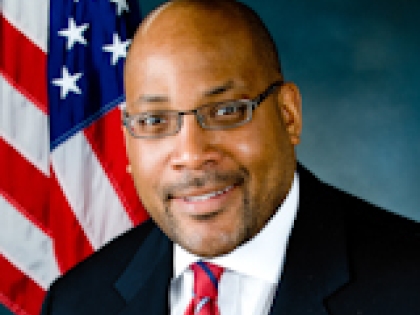
Senator Sampson Breaks Ground Meeting With Health Care Administrators

State Senator John L. Sampson (D-Brooklyn) and State Senate Democratic Leader Malcolm A. Smith (D-Queens) met with administrators from New York City's hospitals and long-term care facilities to discuss the impact of the Governor's health care budget proposals. The meeting, held at the Kingsbrook Jewish Medical Center in Brooklyn, was intended to devise strategies to minimize the potential impacts absorbed by health care facilities.
Over sixty participants took advantage of the unique opportunity to express their specific needs and convey solutions for health care reform. "The exceptional attendance at this crucial meeting illustrates the desire to work in partnership to ensure that we provide improved health care service to our community. This was the first of many open dialogues between health care professionals and state officials," said Senator Sampson.
"As the Ranking Democratic member of the Senate Health Committee, I want to send a clear message to our workers in the health care industry who have served us so well that we are your friends and your partners, helping to ensure that the people of this great state have proper access to quality health care. We are not going to dictate how hospitals pay their bills and complete their mission of delivering the quality health care that our families deserve."
Senator Sampson noted that this first-of-its-kind gathering was designed to enable administrators who stand on the front lines of acute and long-term care to explain their ideas, their needs, and their concerns, not through representatives, not through filtered intermediaries, but directly to us.
"When health care is a substantial portion of the state budget, it warrants careful investigation into how to fix a broken system. Who better to provide remedial ideas than those who actually provide the service? There is no doubt that the average New York State hospital acts dually as the provider of basic care and the economic engine of the communities they serve. It is also unquestionable that the vast majority of these institutions are currently losing money. With the combined impact of the Berger Commission's recommendations and the federal health care funding reductions, state officials must question how hospitals can sustain these cuts, remaining mindful not to push these providers to a point where basic care suffers," continued Senator Sampson.
Senator Sampson concluded that "many ideas were proposed during our meeting, such as HMO reinvestment legislation, addressing reimbursement rates, restoration of the trend factor and GME funding, and public hospitals' direct purchase of energy at wholesale prices. These ideas will be compiled and directly conveyed to my Democratic colleagues and policy analysts and communicated during budget negotiations. I look forward to a long and fruitful relationship with the leadership of the health industry so that together we can find the necessary solutions within a fiscally safe plan to provide all New Yorkers with the health care they deserve."